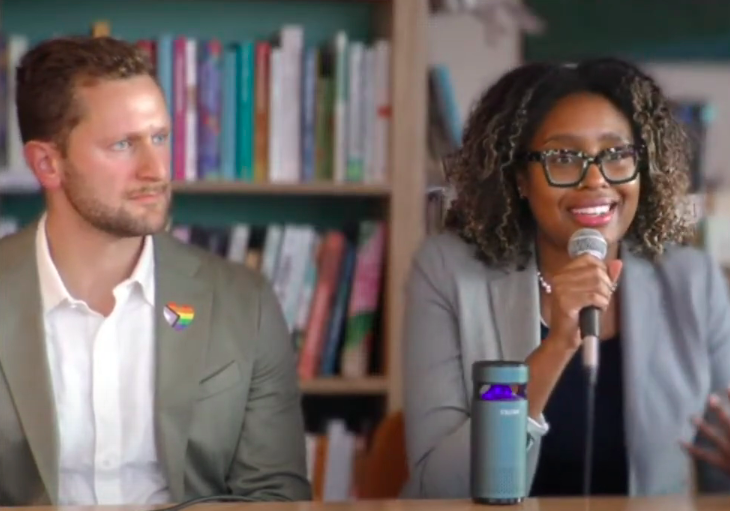Last Sunday, Culver City Council candidates joined a forum hosted by the Culver City Democratic Club (CCDC) to vie for the clubs’ endorsement in the November election and make their platforms on housing, public safety, and the city budget known.
Four council candidates – Culver City Mayor Yasmine-Imani McMorrin, Culver City Planning Commissioner Nancy Barba, L.A. County Transportation Deputy Bubba Fish, and Culver City Cultural Affairs Commissioner Jeannine Wisnosky Stehlin – joined moderator Judith Martin-Straw, Editor and Publisher of Culver City Crossroads, for a panel of introductions, past frustrations, and future hopes for the city. Two candidates for Culver City Council, current Councilmember Albert Vera, and Denice Renteria, were not present for the forum. Neither Vera nor Renteria have received endorsements from the CCDC in the past.
The forum began with a question on housing – how would each candidate directly address the housing crisis in Culver City on the Council? Culver City residents face a shortage of affordable housing. Homeownership is largely impossible for low-income and moderate-income residents and the housing cost burden is high – the Culver City Housing Element found that 43 percent of renters in the city spent at least 30 percent of their monthly income on housing. 22 percent of renters spent more than 50 percent of their income on housing.
All of the candidates advocated for more tenant protections and measures that would increase the housing supply.
In her tenure as a City Planning Commissioner and housing advocate, Nancy Barba recognized that the current crisis didn’t appear in a vacuum. “We did not get here overnight,” Barba said. “It took decades of policy decisions to get us to this place. This is why I strongly support care, housing first, and strongly oppose the criminalization of poverty and being unhoused.” Barba’s priority on the City Planning Commission, she said, was streamlining housing proposals and getting rid of parking minimums to increase the city’s housing supply.
Bubba Fish, who was the vice chair of Culver City’s Housing and Homelessness Committee, pointed to his hometown of Houston as a model for effective and timely action. Fish said Culver City should embrace the housing first model. “Once you bring people into housing, that’s the first thing that they need, and then they can address other issues that they might be having in their lives… Everything hinges on having housing.” Fish advocated for better renter protections and later echoed Barba and Mayor McMorrin’s criticism of the city’s anti-camping ordinance.
Mayor McMorrin likewise called the housing crisis a policy failure. In Culver City, where she has served on the City Council since 2020 and is the current council-appointed Mayor, she saw a need for diverse tactics to effectively confront the issue and make the entire city liveable for its residents. Mayor McCorrin said there can be no “Silver bullet,” no single program to reverse the decades of policies that have led to this pressure point. McCorrin also called for denser housing across the city, and not just in the city’s most diverse neighborhood of Fox Hills. “We need to unequivocally support renters and rent control. We need to unequivocally stand by tenant protections and we need to do everything that we can to support more housing in Culver City.”
Jeannine Wisnosky Stehlin related the housing crisis to her personal experience, noting the disappearance of affordable housing as it gets bought up and replaced by developers. She also advocated for “Mom-and-pop landlords.”
Martin-Straw then asked candidates about public safety. Since 2020, the Culver City Council has solicited reports on policing in Culver City and how city resources could be better spent on public safety by redirecting the budget to health, housing, and transit services.
Mayor McMorrin, along with Barba and Fish, noted that the reports from the Center for Public Safety Management, Solidarity Consulting, the General Plan Advisory Committee’s Public Safety Technical Advisory Committee, Remy and Associates, Million Dollar Hoods, and the UCLA Law School’s Criminal Justice Project have yet to be implemented by the city. The reports recommended generally that Culver City reallocate funding from its police department to other public safety initiatives and end its reliance on a system that is demonstrably racist, ineffective, and excessively budgeted. Some of the candidates expressed frustration with the City’s inaction on the six separate reports.
“Let’s pick one and do it right now because we aren’t doing anything,” McMorrin said. The General Plan’s Public Safety recommendations, which were informed by a survey of Culver City residents, were not approved by the Council last year. “We are really discarding people who believed in a process and who… believed the commitment that the council put out,” McMorrin said, referencing the Council’s messaging surrounding the protests of police violence in 2020. “We have just so quickly discarded that as it’s gotten out of the news cycle. I’m so deeply disappointed by that.”
Fish discussed the Culver City Police Department’s primacy in the city’s overall budget, noting that 33 percent of the city’s resources went to policing while public safety programs struggled to provide services. He called for more robust funding for the city’s Mobile Crisis Team, a landmark program that employs a unit of specialists, clinicians, and caseworkers to respond to mental health crises instead of the customary armed police response. Fish also advocated for a police oversight board.
Barba said she would implement all of the recommendations from the reports the Council solicited, adding that many of the recommendations focused on decriminalization could be achieved overnight and at no cost to taxpayers. She referenced the Public Safety recommendations from the General Plan subcommittee, noting that most respondents supported not having police respond to non-criminal situations. “When we have one tool, we only see things through that lens,” Barba said. Culver City needs to expand its toolset, she said, by changing the level and scope of police response, particularly when other professionals are trained and more able to appropriately and adequately respond to various crises typically assigned to police.
Jeannine Wisnosky Stehlin said she had not read any of the reports and was not familiar with their recommendations. Of all of the candidates present at CCDC’s forum, Wisnosky Stehlin was the only one who did not say she wouldn’t accept an endorsement or contributions from police organizations.
Next, the council candidates considered the city budget and how they would address its projected deficit.
McMorrin, Barba, and Fish returned to the previous question of police spending. Fish said the budget offered an opportunity to reprioritize city spending. “We approved a multi-million dollar contract for license plate readers, we approved a $1 Million reserve fund that mostly goes to the police department. We approved just recently another $150,000 for GPS trackers,” Fish said.
“These items might sound flashy and appealing to some, but to me, public safety is so much more holistic than that.“
Fish wrote about the City’s surveillance technology purchase and public safety policy in Culver City for Westside Voice.
Nancy Barba agreed with the need to reexamine police spending and said a bottom-up budgeting approach could help clarify how the city allocates resources.
McMorrin concurred with Barba’s assessment, saying she has consistently questioned the budgeting process in the city. For the first time this year, McMorrin led a community budget workshop, a practice she hoped would continue and improve. “Our community is not asking for police darts to track people for eight hours, they’re asking to be safe. We know that safety is a spectrum of housing, of living wages, of health care, of mental health resources,” McMorrin said. “That’s what our community is asking for, but the things that we fund are typically incongruent with that.”
There are three Culver City Council seats up for election this November. Next week, CCDC members will vote to endorse three candidates for the Council. Their endorsement will be announced on June 14.
Photo of Bubba Fish and Mayor Yasmine-Imani McMorrin obtained through screen capture.
Stay informed. Sign up for The Westside Voice Newsletter
By clicking submit, you agree to share your email address with Westside Voice. We do not sell or share your information with anyone.








